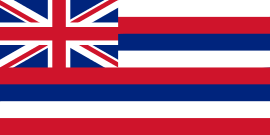Edward Preston
Edward Preston (1831–1890) was a lawyer and judge originally from England who served in the Kingdom of Hawaii.
Early life
Edward Preston was born 17 February 1831 in London, England. In 1852 he sailed to Melbourne, Australia, and then practised law in Christchurch, New Zealand in the firm Wynn Williams & Co.[1]
Hawaiian citizenship
He married in 1852, and came to the Hawaiian Islands with his wife in 1870. He became a citizen of the Kingdom of Hawaii on 1 April 1871,[2] and was admitted to the bar 5 April 1871. He worked in the offices of Richard H. Stanley in 1875. He was awarded the Royal Order of Kapiolani with rank of grand officer.[3]
Political career
He was appointed Attorney General on 3 July 1878 by King Kalākaua, and served until 14 August 1880.[4] He replaced Alfred S. Hartwell.[5] In the 1878, 1880, and 1882 sessions he was in the legislature of the Hawaiian Kingdom in the House of Nobles. Working as a clerk for the judge in the legislature was John Mahiʻai Kāneakua who would sign the memorial from the Hawaiian Patriotic league to restore the monarchy in 1893.[6]
He was appointed again on 19 May 1882, in the cabinet headed by controversial Walter M. Gibson. Gibson was widely known to be funded by sugar trader Claus Spreckles, who also had many personal loans to Kalākaua. The cabinet approved giving Spreckles a large tract of land on Maui to settle his claim on the crown lands, and an expensive coronation ceremony for Kalākaua.[7] Gibson became acting attorney general even though he had no law training, on 14 May 1883.
Supreme Court
On 7 July 1885 Preston was appointed to the supreme court of the kingdom under chief justice Albert Francis Judd. One incident that led to the downfall of Gibson was a Chinese planter T. Aki who said he had made a "gift" to Kalākaua expecting to receive a license for opium trading. When the license was given to someone else who paid more, Aki wanted to get his money back. This scandal and the other debts of Kalākaua resulted in the 1887 Constitution of the Kingdom of Hawaii which took away much of the king's power, and a trustee to pay off debts. Preston ruled that Aki had a valid claim, and he should be paid back with the other creditors.[8]
Preston served on the supreme court until he died 17 January 1890.[4] His funeral was at the St. Andrews Cathedral.[3]
References
- ↑ Peter Whiteside (30 January 2009). "150th Anniversary of Wynn Williams & Co". Wynn Williams & Co. Retrieved 11 July 2010.
- ↑ "Citizenship record". state archives digital collections. state of Hawaii. Retrieved 10 July 2010.
- 1 2 "Mr Justice Preston: Passes Quietly Away to his Long Rest at His Residence, King Street". The Hawaiian Gazette. Honolulu. 21 January 1890. Retrieved 9 July 2010.
- 1 2 "Preston, Edward office record". state archives digital collections. state of Hawaii. Retrieved 10 July 2010.
- ↑ "Attorney General office record" (PDF). state archives digital collections. state of Hawaii. Retrieved 10 July 2010.
- ↑ John William Siddall (1917). Men of Hawaii: Being a Biographical Reference Library, Complete and Authentic, of the Men of Note and Substantial Achievement in the Hawaiian Islands. Honolulu Star-Bulletin. pp. 159, 162. OCLC 656828381.
- ↑ William DeWitt Alexander (1896). History of later years of the Hawaiian Monarchy and the revolution of 1893. Hawaiian gazette company. pp. 8–9.
- ↑ Ralph Simpson Kuykendall (1967). Hawaiian Kingdom 1874-1893, the Kalakaua Dynasty. 3. University of Hawaii Press. p. 406. ISBN 978-0-87022-433-1.
| Government offices | ||
|---|---|---|
| Preceded by Alfred S. Hartwell |
Kingdom of Hawaii Attorney General July 1878 – August 1880 |
Succeeded by Claude W. Jones |
| Preceded by Henry A. P. Carter |
Kingdom of Hawaii Attorney General May 1882 – May 1883 |
Succeeded by Walter M. Gibson |
